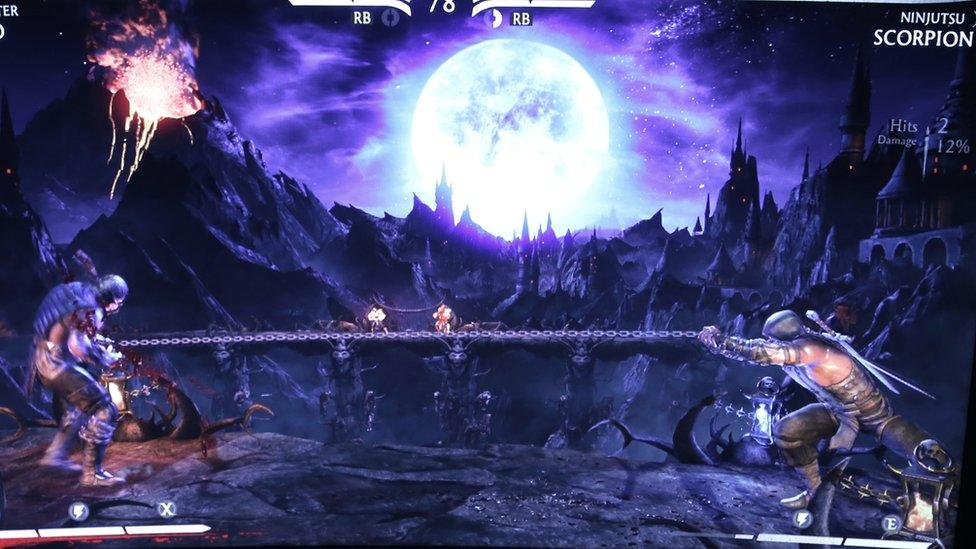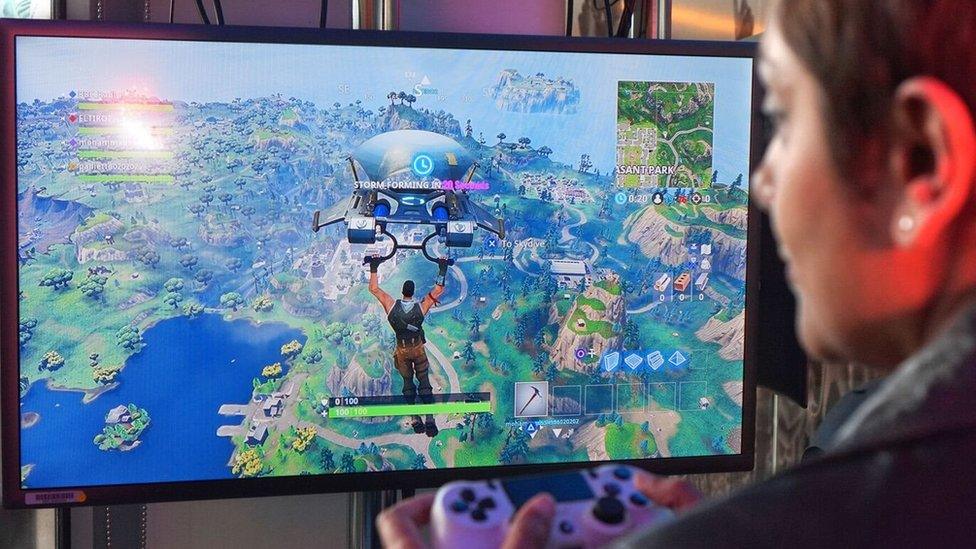Why can't I beat my 12-year-old at computer games?
- Published

Fortnite is an online game in which players fight it out for survival
An expert recently advised parents to play computer games along with their children - but have they any hope of winning?
According to William Shakespeare: "Cowards die many times before their deaths."
If he had been alive today, he could have added that the middle-aged computer gamer dies with even greater regularity.
Every day, as I try to recapture the skills of my youth, I suffer the ignominy of being repeatedly blasted out of virtual existence, probably by a primary school pupil.
Then, as I grudgingly hand over the console controller to my 12-year-old son, I watch as he makes it all look so easy.
The latest field of despair has come in the form of Fortnite - an online fight for survival that has left me tearing out the little hair I have left.
It is a game which has caused some concern among parents over the time their children spend playing it and the potential for addiction.
That prompted one expert to advise adopting an "if you can't beat them, join them" approach.
However, that remains a challenge in itself as it regularly ends in embarrassment and defeat.
But what is the expert advice on what causes this gaming gap and how can it be bridged?
A matter of time

Building skills acquired in games like Minecraft can be combined with combat in Fortnite
Dr Dayna Galloway, head of the division of games and arts at Abertay University, said there were a number of factors at play.
"Firstly, I'd hazard a guess that your son has more free time than you, and can spend more time either playing the game, or obsessing over strategies and tips to refine techniques that lead to increased chances of success," he said.
"Secondly, at 48, you may no longer be the target audience for the games you are getting 'out-performed' in.
"If you're anything like me - building AND shooting isn't easy, but for a 12-year-old exposed to Minecraft at a young age, it isn't an issue."

Dr Dayna Galloway said 48-year-olds might not be the target audience for many games
Dr Galloway said a third issue was being able to spot threats from a distance which could be just a few pixels on a screen and age did play a part.
"I'd encourage playing on a Saturday afternoon in a well-lit room, instead of playing at 10pm with tired eyes after a busy day at work," he suggested.
Skills shortage

Online gaming tries its best to pit you against people with similar ability levels
But what about the decline from your game-playing peak?
"Again, you had time to master these games in your youth," said Dr Galloway.
"More often than not, you'd also be playing against the computer, or friend in the same room."
He said online gaming had changed things and while developers tried to ensure things were balanced it remained "very challenging" to match people of similar abilities.
"In Fortnite, you are being dropped into the same game as 99 other players, so the odds of them all being the same skillset as you is highly unlikely," he said.
However, all is not lost, he suggested.
Using customisation and accessibility features to your advantage, rather than accepting default settings may help.
Kit is key

So is there anything you can do to level that playing field?
"Yes - copy what young people (and some older people) do," said Dr Galloway.
He said using community forums or watching other gamers on Twitch and Youtube could help develop strategies and tactics.
"You can also level the playing field a little by trying to ensure your technology setup is the same as other players," he said.
"So consider buying a surround sound headset so you can locate enemies before you see them."
Losing my addiction

And how worried should we be about the amount of time our children spend playing games anyway?
"Anything taken to obsessive levels by children should be a cause for concern to parents," said Dr Galloway.
"A child can get 'addicted' to playing football, playing videogames, watching TV, reading books etc.
"What is important is that the parent shows an interest in the activity the child is happy to immerse themselves in, and limits the duration of their engagement to appropriate healthy levels."
One part of that, he said, was joining them in the gaming world.
'Limit sessions'
"So, play along with your child, show them the games you played in your youth, and have discussions about the content of games and the experiences they have within them," he said.
"Many games consoles and games also have fantastic parental controls - so you can set things up in a way to ensure the maximum degree of safety for your child's online activity.
"You can also limit play sessions and game access to particular times of the day if you need to establish or intervene and re-establish a specific level of engagement.
"It's also important to broaden the menu for play - so encourage your child to seek out new genres of games, participate in different sports and be open to new activities - and the best way to do this is to lead by example."
- Published1 August 2018

- Published19 July 2018

- Published23 May 2018

- Published22 May 2018

- Published3 May 2018

- Published29 March 2018

- Published12 March 2018
